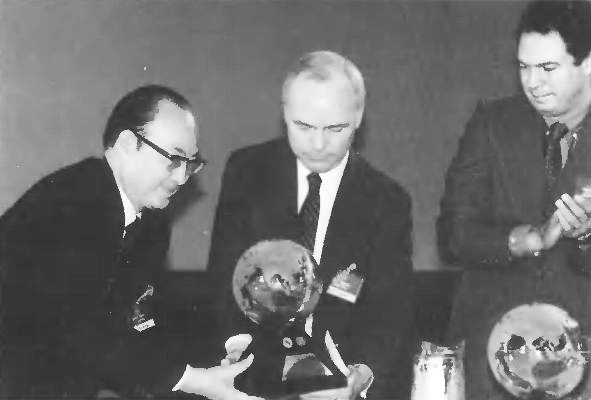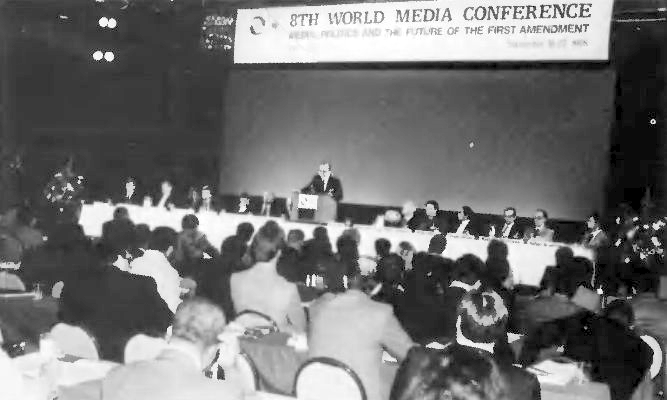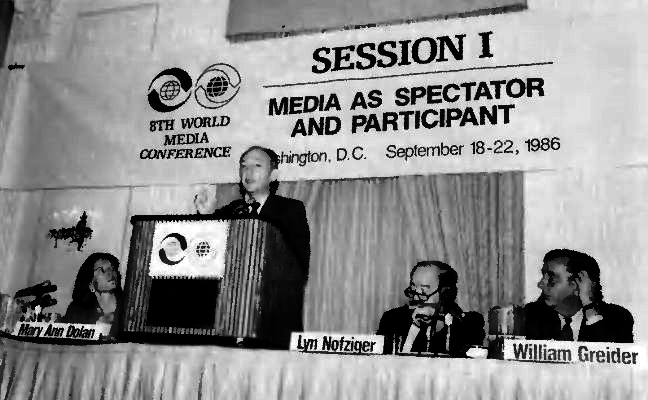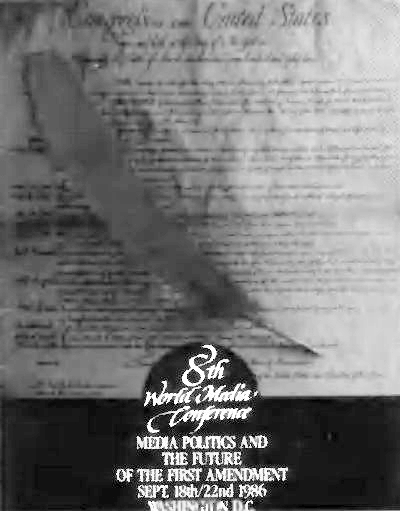![]()
The Words of Sun Myung Moon from 1986
|
|
The Words of Sun Myung Moon from 1986 |

Dr.
Bo Hi Pak presents the 1986 Ethics Award for Journalism to Mr. Brian
P. Lamb, chairman of C-SPAN Public Affairs Network. Looking on is Mr.
Pedro Chamorro, former editor of La Prensa newspaper in Managua,
Nicaragua, who received the 1985 Ethics Award for Journalism.
Dr. Bo Hi Pak introduced Father's message with these words:
On two occasions in the past, Rev. Moon himself has delivered the Founder's Address at the opening of the World Media Conference.
This year, however, Rev. and Mrs. Moon were invited to the opening of the Asian Games in Seoul, Korea, which takes place today. I am delighted to share the news that his third daughter, Un Jin Moon, has been chosen by the Korean Olympic Committee to represent her country in the equestrian competition.
Rev. Moon wanted to be there to support his daughter, the youngest member of the riding team, and he asks for your understanding.
All of us, before we are journalists or any other kind of professional, are first human beings. The first responsibility of a human being is to exercise freedom in accord with basic moral principles. For the journalist, freedom of the press must be exercised according to certain moral standards which are common ground for all free men. This is where the importance of responsibility in media comes in. For this reason, as founder of the World Media Conference, I emphasize the fight for the freedom of the press, as well as the moral responsibility of the media.
And therein lie the two main reasons for the founding of the World Media Association:
In places where freedom of expression does not exist, its first mandate is to provide support and leadership in the struggle for worldwide press freedom, freedom of speech, and the free expression of man's relationship to God.
In places where press freedom already exists, the second mandate of the World Media Association is to promote and encourage the responsible and ethical practice of the media profession.
Thomas Jefferson once wrote, and quite correctly: "The press is the best instrument for enlightening the mind of man and improving him as a rational, moral, and social being'.' Jefferson went so far as to say that our very liberty itself depends on freedom of the press, and that press freedom could never be limited, not even a little bit, without being lost entirely. There is a great deal of truth in this.
Yet how can we become instruments for enlightening the mind of man and inspiring him as a rational, moral, and social being without ourselves first being rational, moral, and social beings? We must understand basic principles which determine what is moral and what is immoral. We must come to a basic understanding of the earthly application of the spiritual laws of God.
Democracy cannot be exercised without a free press. And a free press cannot be truly free unless exercised with moral responsibility. I believe that a free press is a moral press. Those who are media professionals take special pride in this. This is why you can say that journalists hold a special place in our society. You are the guardians of freedom and fighters against injustice.
Nevertheless, it is clear from almost every recent survey of public opinion that media credibility and esteem is declining. Should the public trust in the media continue to erode, the inevitable result would have to be limitations placed on press freedom -- limitations that would most likely end with the complete loss of the free press, as Thomas Jefferson clearly warned. With that would come the complete loss of America's democracy.
Such a loss would not only be tragic for America but would pave the way for the total decline of the free world. The World Media Conference brings together men and women of integrity and good will from all parts of the world, in the belief that such a gathering -- and its resulting publications -- will contribute to the ongoing development of the conscience of the media.
Good people in the media, working together in common purpose, can make a difference. Certainly to make this effort is, I believe, one of the noblest crusades of our time.
I am sorry to be unable to be with you to deliver this message in person. I congratulate you, however, for putting your minds and hearts into this noble task ahead.
May God bless you and the work you are doing.
Thank you very much.

Bo
Hi Pak delivers the Founder's Address at the opening plenary session.
The United States Capital, always humming with the latest political and intelligence gossip, was given a bowlful of novel tidbits to buzz about in the wake of the eighth World Media Conference.
The event focused on an issue that is little discussed today, namely, the moral responsibility of the media to promote truth and freedom around the world without ideological bias.
The 250 participants at the five-day conference, which was held September 18 to 22 at the Omni Shoreham hotel in Washington DC, were treated to a glittering array of speakers and panelists, both liberal and conservative. They also heard addresses from Father, in absentia, and from Dr. Bo Hi Pak, president of the World Media Association and of News World Communications Inc. The participants were mostly conservative journalists and government officials.
The conference, entitled "Media, Politics, and the Future of the First Amendment;' was sliced into bite- sized sessions on more specific topics. The sessions, in turn, were interpolated with a string of addresses by prominent political personalities, which constituted media events in their own right.
Panelists included ABC Senior Vice President Richard Wald; syndicated columnists James Kilpatrick, Carl Rowan, and Morton Kondracke; former Reagan administration political adviser Lyn Nofziger; Rolling Stone magazine's national editor Richard Greider; John McLaughlin, producer and host of the TV news show The McLaughlin Group; and neoconservative writer Midge Decter, who also founded the Committee for the Free World.
The panels discussed how the media actually participate in making the news, the way in which economics is reported, investigative ethics, and the extent to which and manner in which terrorism should be reported on. A thread that tied together all the panels was the consensus that the major media are biased in a liberal direction.

Mr.
Richard Wald, senior vice president of ABC News, addresses Session I.
At lunch on the 19th, Clare Booth Luce, famed author, former U.S. ambassador to Italy, and pillar of conservative thinking, spoke. She noted that Soviet leader Mikhail Gorbachev "should have framed a businessman or a banker" rather than a journalist (Nicholas Daniloff), because the Western news media, seeing a threat to their profession, will most certainly not forget Daniloff, as they might have someone else. Mrs. Luce was preceded by Arnaud de Borchgrave, who has been called the last of the "world-class" correspondents and who is now editor in chief of The Washington Times.
At dinner that evening, Representative Henry Hyde, Republican of Illinois, addressed the participants, calling for the "pluralization" of the Soviet Union -- not just a continuation of the enormously tense U.S.- Soviet status quo, but a "deLeninization" of that communist nation by, for example, strengthening the Voice of America radio system.
The address at lunch on Saturday the 20th was delivered by two former leaders of the New Left movement of the 1960s and early 1970s in America, young men who once supported Fidel Castro and hailed the defeat of U.S. forces in Vietnam. David Horowitz and Peter Collier, who had also been editors of the well-known leftist magazine Ramparts, called for a "war on the left:' having come to the realization that communism is a "threat from within" that could destroy the United States.
The next day, Zbigniew Brzezinski, who had been President Jimmy Carter's national security advisor, spoke. Although he insisted that the "rivalry" between America and Russia was essentially unresolvable, he said that a summit meeting between Gorbachev and President Reagan should be put off until the issue of the Soviet occupation of Afghanistan is resolved.
The concluding day's luncheon talk, on September 22, was given by U.S. Secretary of the Navy John Lehman.
He called the participants' attention to a vast gap in naval strength that the Soviets have opened up over the United States, despite impressive improvements in the U.S. Navy during Reagan's term.
Dr. Bo Hi Pak read an address by Father at the opening plenary session. In his capacity as founder of the World Media Association and its annual conference, Father called for a "moral press."
'A free press cannot be truly free unless exercised with moral responsibility:' he said. "I believe that a free press is a moral press:'
He said that if the press loses the confidence of the American people through being unable to promote truth and freedom -- that is, to undertake an "earthly application of the spiritual laws of God" -- then the people would see to it that restrictions were imposed on the press. This, in turn, would lead to erosion of liberty itself.
In his own talk at the opening plenary session, Dr. Pak hammered at the need for consistency in the media. While it is "fine" to attack abuses in the U.S. government or the apartheid system in South Africa, he said, the media must evenhandedly blast Vietnam for causing the exodus and deaths of hundreds of thousands of "boat people:' They must equally highlight the Soviet-sponsored "holocaust" in Afghanistan and the oppression of Jews and Muslims in the Soviet Union.

On September 1, CAUSA USA launched a campaign throughout the United States to heighten people's awareness about values that should be at the forefront of the nation's consciousness. People are being asked to demonstrate their support for the primary goals of CAUSA USA by signing a petition form. The goals are:
1. To affirm a God-centered morality in America
2. To uphold freedom for all
3. To educate people about the dangers of atheistic communism.
The signature campaign is part of a larger, long-range campaign to increase public awareness of CAUSA USA and its goals. Those providing their name and address will receive information brochures, a sample newsletter, and invitations to CAUSA's programs.
As a result of the pioneering work of CAUSA international, CAUSA USA was founded in 1983 as a tax- exempt, educational organization to address problems in the United States such as the decline of religious values, increasing immorality, and the spread of atheistic communism.
Its activities are based on an ecumenically-oriented philosophy that emphasizes belief in God, that each human being is a child of God, that the individual has a right to freedom, and that selfless love is the highest virtue. When these values are cultivated, people come to view each other as brothers and sisters. Thus, the exploitation of others, racial and religious bigotry, drug abuse, apartheid, family breakdown, and other social ills become abhorrent. It follows that communism, which systematically suppresses religion and other fundamental human freedoms and values, must be viewed as abhorrent.
More than 50,000 religious, civic, and community leaders have participated in CAUSA USA seminars over the past three years. Programs such as food distribution to the needy, housing renovation in blighted areas, and relief programs to the Miskito Indians and other refugees have been developed out of the efforts of the graduates of CAUSA programs.
The president of CAUSA USA is the Honorable Phillip Sanchez, who formerly served as the American ambassador to Colombia and Honduras and who directed the Office of Economic Opportunity from 1971 to 1973.
In addition to the signature campaign, CAUSA USA has recently initiated the CAUSA USA Veterans' Association (CVA). Both CVA and the CAUSA Ministerial Alliance (CMA), an older project of CAUSA USA, will sponsor numerous seminars in the coming months.
CAUSA USA invites interested people to participate in its activities. Volunteers are especially needed to circulate petition forms for the current signature campaign. Those who would like to help should contact the local office (there are more than 400) nearest them by writing or calling the CAUSA USA national office at:
One Penn Plaza, Suite 100
New York,
New York 10119
Telephone: (212) 967-2400